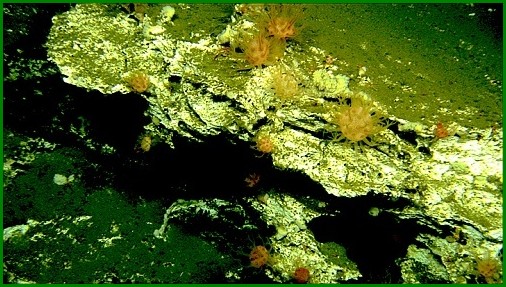Scientists warn of a high risk of degradation of marine ecosystems and human hardships Scientists warn of a high risk of degradation of marine ecosystems and human hardships - a large group of researchers from different countries made the feat, which, unfortunately, remain unnoticed by the general public.
Deep-sea corals (for example, this Anthomastus in the Pacific Ocean near the mouth of the river Uhryniv) will be able to survive in conditions of oxygen starvation. (Photo by UC San Diego.)
First described the whole chain of biogeochemical changes in the ocean caused by anthropogenic emissions of greenhouse gases - the whole cascade of events that affect not only the habitat of marine organisms and the depths of the ocean, but also on people.
Previous studies have focused primarily on the ocean warming and acidification and largely underestimated the biological and social impacts of climate change.
The new analysis is based on the synergistic predictable changes (decrease of oxygen in the sea water and reduction of productivity of ocean ecosystems), and shows that in 2100, no corner of the World Ocean will not stand aside from climate change. More will suffer, of course, those sites that undergo simultaneous effects of warming, acidification and oxygen reduction and productivity - said lead author Camilo Mora of the University of Hawaii at Manoa (USA). - The consequences will be ambitious, because the survival of the species, number of animals, the range of body sizes, biodiversity, ecosystem functioning - it all depends on the biogeochemistry of the ocean.
Will be affected not only the food chain, but also fishing to tourism. According to a study from 470 to 870 million of the poorest people in the world live seafood. Consequently, jobs, income, and life itself in many countries will change along with the biogeochemistry of the ocean.
A lot of deep-water ecosystems are so stable that even small changes in temperature, pH and oxygen levels can reduce the resilience of deep-sea communities - emphasizes the co-author Lisa Levin, director of the Center for Marine Biodiversity and Conservation of the Oceanographic Institute. Scripps (USA). - We are concerned and the fact that people extract more resources and more and more worried about the depth of the ocean.
Camilo Mora and Craig Smith of the University of Hawaii at Manoa joined forces 28 people, who included experts in climate modeling, biogeochemists, oceanographers and sociologists.
The researchers took advantage of the most modern and reliable models of projected climate change, developed for the Fifth Report of the Intergovernmental Panel on Climate Change. The calculation of matching changes in temperature, pH, oxygen and primary productivity, based on two scenarios - conventional, in which the concentration of CO2 in the atmosphere could reach 900 parts per million by 2100, and in the alternative, in which the concentration will stop at around 550 parts per million (It needs immediate concerted action to reduce emissions of carbon dioxide).
It was found that the larger part of the surface of the ocean at the same time test the effects of warming, acidification, oxygen starvation and performance degradation of varying intensity. Only a very small part of the oceans (mainly in the polar regions) will face the opposite, that is, with the increase of oxygen and productivity, while cooling and increase the pH should not expect anywhere else.
Even seemingly positive change in high latitudes do not necessarily benefit - emphasizes the co-author Wei Chilin of Memorial University of Newfoundland (Canada). - In these areas due to changes in ocean conditions immigrate invasive species that threaten the local livestock and people living at her expense.
Scientists have mapped the 32 marine habitats and hot spots of biodiversity and tried to assess their potential vulnerability to change. Brought also evidence of human dependence on marine goods and services and opportunities for social adaptation to assess the vulnerability of coastal communities to predicted changes biogeochemistry of the ocean. Other studies have focused on local effects, and we are the first to consider all the world's oceans and how the associated stress will affect a variety of habitats and the people, - says soavtorEndryu Thurber of Oregon State University (USA).
By 2100, the global average for the upper layer of the ocean will be about the: temperature increase by 1,2-2,6 ° C (hereinafter - compared with the current performance), the concentration of dissolved oxygen in the water to decrease by 2-4% pH - at 0,15-0,31, the amount of phytoplankton production - by 10.4%. Change of temperature and pH on the seabed, according to forecasts, will not be as significant, but the reduction in oxygen levels - roughly the same.
The largest absolute changes occur in the biogeochemistry of the ocean coral reefs, seagrass beds and shallow soft-bottom benthic environments, while seabed habitats will be affected the least. Deep-water systems cover the greater rigor of the surface of the Earth and provide a range of important ecosystem services: hide carbon in the sediments of the sea floor, absorb the acidity of the ocean and serve as a great reservoir of biodiversity - like Mr. Smith. - Nevertheless, modeling the effects of climate change on this truly vast ecosystem gets very little attention.
The consequences of climate change will feel the entire ocean from top to bottom - emphasizes the co-author Andrew Sweetman of the International Research Institute of Stavanger (Norway). - Scary to think how great the impact will be. This is our heritage, and we can not ignore it.
